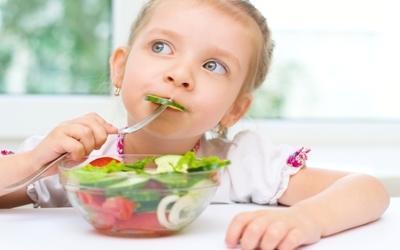Could Your Child’s Five-A-Day Give Them Leukemia?
Giving your child plenty of fruits and vegetables is vital to ensure their wellbeing, but what if this produce is potentially cancerous? According to a new study, published in the journal Therapeutic Drug Monitoring, the most common form of childhood cancer, acute lymphoblastic leukemia (ALL), is linked to higher levels of pesticides. Fortunately, a few simple changes around your house can lower your child’s risk.
For the study, 112 mothers – 41 of whom had children with ALL – filled out questionnaires asking about use of indoor pesticides, pet products, and lawn services, and how frequently they were exposed to these products before conception, during pregnancy and at the time of the study. While 33% of mothers of the children with ALL reported using pesticides, only 19% of mothers in the healthy group reported likewise. The researchers also took urine samples of the children, and although pesticide residues were present in 99% of the urine samples, levels of two specific pesticides were 25% higher in the children with ALL.
The two major pesticides detected in the ALL children are part of a group of chemicals known as organophosphates. The fact that these pesticides harm human health is nothing new, as they’ve long been known to interfere with your nervous system. However, this doesn’t stop organophosphates from being used in 70% of the insecticides in this country. Most notably, these chemicals pop up in chemically grown fruits and vegetables and flea and tick products. The Environmental Protection Agency (EPA) has even banned two forms of organophosphate pesticides for indoor use.
According to Warren Porter, PhD, professor of environmental toxicology at the University of Wisconsin, Madison, the findings aren’t surprising, as his own research has found that pesticides affect human health, interfering with your immune system and hormone levels. He warns, ‘Once you start messing with hormones and immune systems, you raise the risk of cancer.’ So what can you do to enhance your environmental wellness, and protect your family against exposure to organophosphate pesticides?
1. Start at your front door: Even if you don’t use pesticides in your home, chances are you have higher levels of them inside than outdoors as people track pesticides in on your shoes. Porter explains, ‘You get pesticides on the soles of your shoes and then it dissolves in the waxes on your floors and in the fibers of your carpet. Taking your shoes off at the front door is a critical first step – pardon the pun.’
2. Check your pets: You often find organophosphates in flea and tick products, so you should avoid collaring your pet with a band of chemicals. Instead, use flea combs, regular baths and less-toxic chemicals to keep pests away.
3. Be careful with your home-grown fruits and vegetables: As organophosphates are common in chemical lawn and garden sprays, they can contaminate your home-grown produce. Porter recommends spraying vinegar on weeds, as this ‘destabilises the waxy coating on plants that are sprayed with it, and they simply dry up and die.’ He adds that encouraging wasps in your garden can help to eliminate other bugs without destroying your plants. ‘People think we’re crazy,’ he admits. ‘But we’ve never had a problem with cabbage worms.’
4. Go organic: UK studies have proved that at least 50% of foods have measurable levels of pesticide residues. The authors wrote, ‘Chronic residential use and the heavy agricultural use of these chemicals on crops, fruits, and vegetables continually expose humans to pesticides via the food chain, air, and water supply despite their short half-lives.’ Porter adds, ‘Anyone concerned about pesticide exposures ought to eat organic foods.’


Comments are closed.